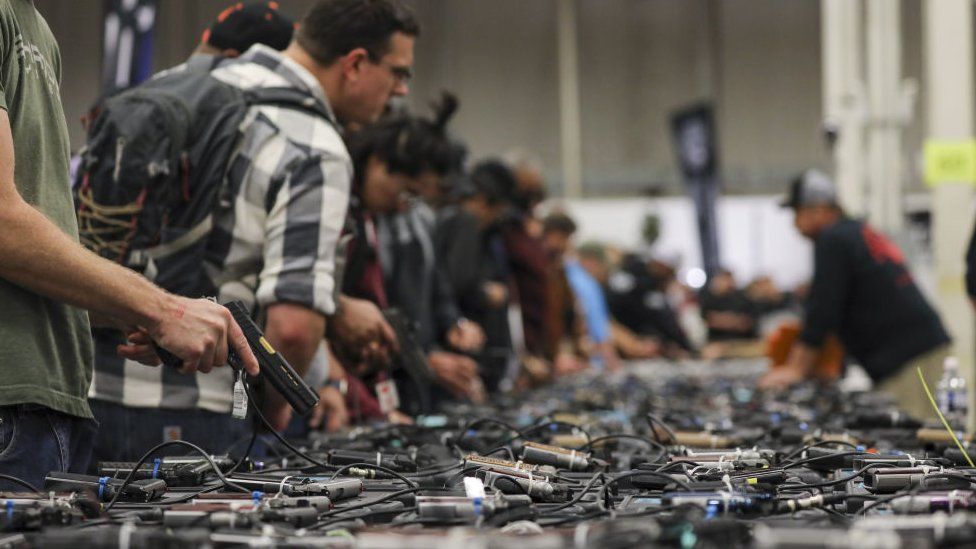Top News: US & International Top News Stories Today | AP News
WASHINGTON (AP) — Laid off by the music streaming service Spotify last year, Joovay Arias figured he’d land another job as a software engineer fairly soon. His previous job search, in 2019, had been a breeze.
“Back then,” he said, “I had tons of recruiters reaching out to me — to the point where I had to turn them down.”
Arias did find another job recently, but only after an unexpected ordeal.
“I thought it was going to be something like three months,’’ said Arias, 39. “It turned into a year and three months.’’
As Arias and other jobseekers can attest, the American labor market, red-hot for the past few years, has cooled. The job market is now in an unusual place: Jobholders are mostly secure, with layoffs low, historically speaking. Yet the pace of hiring has slowed, and landing a job has become harder. On Friday, the government will report on whether hiring slowed sharply again in August after a much-weaker-than-expected July job gain.
“If you have a job and you’re happy with that job and you want to hold onto that job, things are pretty good right now,” said Nick Bunker, economic research director for North America at the Indeed Hiring Lab. “But if you’re out of work or you have a job and you want to switch to a new one, things aren’t as rosy as they were a couple of years ago.’’
Since peaking in March 2022 as the economy accelerated out of the pandemic recession, the number of listed job openings has dropped by more than a third, according to the government’s latest monthly report on openings and hiring.
Temporary-help firms have reduced jobs for 26 of the past 28 months. That’s a telling sign: Economists generally regard temp jobs as a harbinger for where the job market is headed because many employers hire temps before committing to full-time hires.
In a roundup this week of local economic conditions, the Federal Reserve’s regional banks reported signs of a decelerating job market. Staffing agencies have said that job gains have slowed “as firms are approaching hiring decisions with greater hesitancy,” the New York Fed found. “Job candidates are lingering on the market longer.”
The Minneapolis Fed said that a staffing agency reported that “businesses are getting a lot more picky” about whom they hire. And the Atlanta Fed found that “only a few” companies planned to step up hiring.
Job-hopping, so rampant two years ago, has slowed as workers have gradually lost confidence in their ability to find better pay or working conditions somewhere else. Just 3.3 million Americans quit their jobs in July, compared with a peak of 4.5 million in April 2022.
“People are staying put because they’re afraid they won’t find new jobs,’’ said Aaron Terrazas, chief economist at the employment website Glassdoor.
And the Labor Department has reported, in its annual revised estimates of employment growth, that the economy added 818,000 fewer jobs in the 12 months that ended in March than it had previously estimated.
In one respect, it’s not at all surprising that the pace of hiring is now moderating. Job growth in 2021 and 2022, as the economy roared back from the COVID-19 recession, was the most explosive on record. Workers gained leverage they hadn’t enjoyed in decades. Companies scrambled to hire fast enough to keep up with surging sales. Many employers had to jack up pay and offer bonuses to keep employees.
It was inevitable — and even healthy, economists say, in the long run — for hiring to slow, thereby easing pressure on wage growth and inflation pressures. Otherwise, the economy could have overheated and forced the Fed to tighten credit so aggressively as to cause a recession.
The post-pandemic jobs boom was a marked contrast to the sluggish recovery from the Great Recession of 2007-2009. Back then, it took more than six years for the economy to recover the jobs that had been lost. By contrast, the breathtaking pandemic job losses of 2020 — 22 million — were reversed in less than 2 1/2 years.
Still, the surging economy ignited inflation, leading the Fed to raise interest rates 11 times in 2022 and 2023 to try to cool the job market and slow inflation. And for a while, the economy and the job market appeared immune from higher borrowing costs. Consumers kept spending, businesses kept expanding and the economy kept growing.
But eventually the continued high rates began leaving their mark. Several high-profile companies, including tech giants like Spotify, announced layoffs last year in the face high interest rates. Outside of the economy’s technology sector, though, and, to a lesser extent, finance, most American companies haven’t cut jobs. The number of people filing first-time applications for unemployment benefits is barely above where it was before the pandemic struck.
Yet the same companies that are keeping workers aren’t necessarily adding more.
“Compared to a year or two ago, it’s a lot more difficult, particularly for entry-level folks,’’ Glassdoor’s Terrazas said. “Because of the gradual drip of layoffs in tech and finance, in professional services over the past year and a half, there have been a lot of high-skilled, experienced folks on the job market.
“By all evidence, they are finding jobs. But they are also pushing more entry-level folks further and further down the queue… Recent grads, folks without a lot of on-the-job experience are feeling the effects of suddenly competing with people who have two, five, 10 years’ experience in the jobs market. When those big fish are in the market, the little fish naturally get squeezed out.’’
Despite the pressure of the highest interest rates in decades, the economy remains in solid shape, having grown at a healthy 3% annual pace from April through June. Most Americans are enjoying solid job security.
Still, given the growing difficulty of changing jobs, even some of those job holders are feeling the chill.
“The reality is a lot of people, even when they have jobs, are feeling a lot of angst about the economy,’’ Terrazas said. “People are feeling a little bit job insecurity, a lot more pressure in the workplace than they have in a while.’’
In an August survey, the New York Fed found that Americans as a whole are more worried about losing their jobs now than at any time since 2014, when people were just beginning to feel the full effects of the recovery from the Great Recession of 2008-2009.
Adding to the anxiety is that memories of the recent job boom are still fresh.
“The reference point for most people is still 2021, 2022, when the job market was very strong, and what looks like for us economists as a normalization (of the job market from unsustainable levels), I think for a lot of people feels like a loss of status,’’ Terrazas said.
Consider Abby Neff, who, since graduating from Ohio University in May 2023, has struggled to find the “old-fashioned writing job’’ that she hoped to land in journalism
“It’s been pretty tough,” she said, “to find a permanent journalism job.”
In the meantime, Neff, 23, has joined the government’s AmeriCorps agency, which mobilizes Americans to perform community service, in southeastern Ohio. The job doesn’t pay much. But it has given her the opportunity to write and to learn about everything from forestry to sustainable agriculture to watershed management.
She hadn’t expected to encounter such difficulty in finding a job in her field.
“I feel like I did all the ‘right things’ in college,’’ Neff said ruefully.
She edited a campus magazine and made contacts in the business. She has landed some interviews, only to learn later that the job was filled without her having heard from the employer.
“I will get ‘ghosted,’ ‘’ she said. “I almost feel like I have to hunt employers down to even get a response to an application or submission.”
Arias, the software engineer, started looking for a job “the minute I got laid off’’ in June 2023. At first, he was casual about it. He took time off to care for his newborn daughter and drew money out of his severance package from Spotify. But when the job hunt proved difficult, he “decided to really ramp it up’’ early this year.
Arias started driving for a ride-sharing service and getting job leads from passengers. He reached out to a company through which he had taken part in a computer coding bootcamp, seeking contacts. Eventually, the networking paid off with a new job.
Yet the process proved much more frustrating than he had envisioned. Employers he had communicated with would vanish without explanation.
“That’s the worst part about the experience,’’ Arias said. “You get that introductory message. Then you send your resume. And then that’s it. Communication would end there. Or you’d get an automated response. So you don’t know what happened, what you did wrong … It just feels really demoralizing, really stressful, because you don’t know what happened.”
___
AP Economics Writer Christopher Rugaber contributed to this report.





